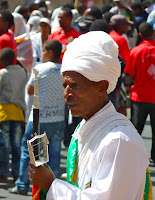Timket (which means baptism or Epiphany in Amharic) is
another religious holiday in Ethiopia. It is the most important orthodox Christian
holiday of the year. Although the
holiday is meant to commemorate the baptism of Jesus in the River Jorden, it
also seems to be a holiday to celebrate the Ark of the Covenant being in
Ethiopia.
 The Ark is thought to have been kidnapped from Jerusalem and
brought to Ethiopia quite some time ago.
It is said to be guarded by a single priest in a church in Axum. Strangely,
no one but this priest is able to see the Ark, so I guess we just have to take his
word for it. There is some sort of
process to replace the current priest/guard should he be called up for higher
celestial duties.
The Ark is thought to have been kidnapped from Jerusalem and
brought to Ethiopia quite some time ago.
It is said to be guarded by a single priest in a church in Axum. Strangely,
no one but this priest is able to see the Ark, so I guess we just have to take his
word for it. There is some sort of
process to replace the current priest/guard should he be called up for higher
celestial duties. Believe it or not, the Ark also has magical abilities and
has the power to emit enough energy to sweep away enemies and any innocent
bystanders. This is why it obviously
needs to stay locked up, hidden away from the rest of the world.
Believe it or not, the Ark also has magical abilities and
has the power to emit enough energy to sweep away enemies and any innocent
bystanders. This is why it obviously
needs to stay locked up, hidden away from the rest of the world.
All churches have a replica of the Ark, and Timket is a big
colourful parade of priests carrying beautiful umbrellas and replicas of the
Ark covered with silk.
Thursday is the Muslim holiday of Maulid, celebrating the
birth of the Islamic prophet Muhammad. It’s nice to be living in a country that is
so inclusive of all beliefs (as we get lots of holidays!).
 |
| Parade going by the Canadian Embassy |
Happy Timket and Maulid to everyone!








